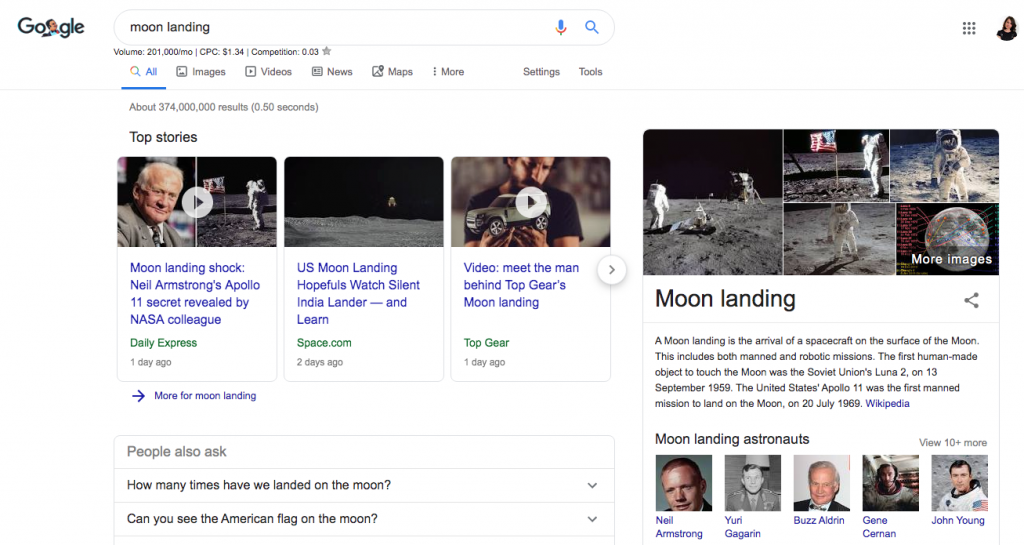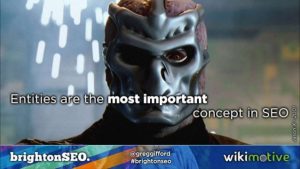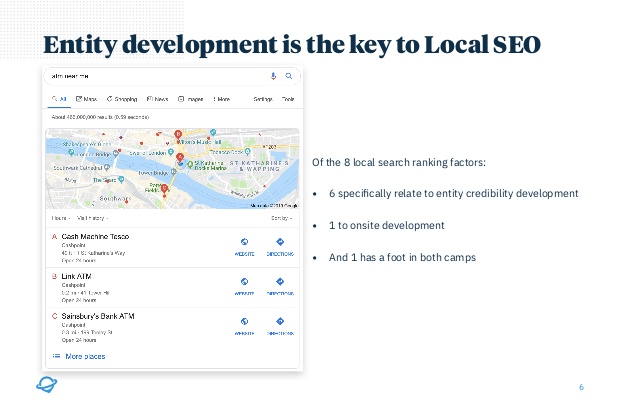Entities in SEO: Hot Topic at Brighton SEO 2019
Content has been dethroned; ‘entity’ is the new King (or Queen) of SEO. In September 2019’s Brighton SEO conference, entities were a core focus for many of the industry’s thought leaders – even within the local SEO sphere. Here, we run through some of the key points you need to know about what entities are, what the experts are saying about them, and how to apply that to your business and its SEO.
Entities in SEO
An entity is something ‘distinct’; it is a thing that can be defined. This could be a place, or it could be a date in time, or it could be a concept – such as an emotion.
How does this relate to Google and SEO? Back in the old days, Google relied on ‘pattern matching’ of the words used by a searcher, to the words on a website. Based on how closely these matched, the ‘most’ relevant website would be at the top of the search engine results page. This is where ‘keywords’ came in, and SEOs have been relying on ‘matching’ their keywords to the various terms that a searcher uses. This is inherently flawed, though, and has been for a while.
Google is now looking at the entity of searches – the concepts behind the words, and their relationships to each other. ‘Exact match wording’ is a thing of the past. So much so, Google isn’t even using words anymore; Google ascribes numbers to these entities and matches entity-to-entity based on these numbers.
This way of sorting information makes it infinitely scalable across languages, language development, and even colloquialisms within the same language. This is because entities exist outside of language. I can use the term ‘petrichor’ and it may mean something to some people in some languages, but nothing to others. However – picture the smell in the air after rainfall. That’s the entity, the concept, of petrichor. You don’t need to know the word to picture it, and neither does Google, now.
Examples of Entities in SEO
To put this in context, let’s delve into some examples. Let’s say you Google ‘moon landing’. The Moon is an entity, and so is landing on it – the ‘concept’ of the event. This will be matched with a number of entities related to this.
You have the knowledge panel, on the right, with a number of facts which are each their own entities. Moon landing astronauts are also listed – each their own entity. Popular questions feature in the ‘People also ask’ section – each question its own entity, ready to be expanded into factual answers. Those facts, of course, are each an entity themselves.


By not focusing on the words used, Google is able to satisfy more varieties of user queries and variations on meaning. Therefore, we receive a search result with a wealth of information on the entity.
Entities at Brighton SEO 2019
In a rare moment of serendipity, I happened to brush up on the concept of entities in SEO one evening, just days before Brighton SEO – not realising that this would be the new SEO darling for some top speakers at the conference.
The first speaker of the day in Auditorium 1 – local SEO expert Greg Gifford – told us that ‘entities are the most important concept in SEO’ and the ‘basis of everything’.


Now, this isn’t a particularly new concept; Greg points out that Google’s knowledge graph – released all the way back in 2012 – revolves entirely around this concept of entities. The Google blog post announcing the knowledge graph literally states:
So if this is the case, why is the buzz around entities only really ramping up now? Well, it’s important to keep in mind that this is something Google was working on in 2012. The knowledge graph still had to grow; it had to learn and develop and begin to make those entity connections in order to serve up the best results.
Google are still filing new patents based on entity search now, which means they’re not done perfecting this yet. There’s a high probability that Google was still doing keyword-to-keyword matching until recently. There’s even a strong case that the Mobile-First Indexing switch of late 2017 through to 2018 was actually Entity-First Indexing. We may only have been living in an entity-search world for around a year and, without any official confirmation of this from Google, the SEO industry is just now starting to really notice the difference, and to change accordingly. However, the techniques and concepts of entities in SEO have been there in the background for much longer. Greg Gifford stated that local SEO has always been about entities. This was corroborated by Ant Robinson’s talk on ‘Building a Brand With Local SEO’.


If entity building has always been a core element of local SEO, we can pivot easily within the industry to apply the same concepts to standard SEO. We’ve been doing it, potentially without realising it, for years.
Local SEO is all about establishing real-world connections in your local area; what are you doing when you do that? You’re connecting your entity with other, local, entities.
How to Rank in an Entity SEO World – According to Brighton SEO
It is paramount that you begin to consider your company as an entity – that’s the lynchpin of this concept. Then, you need to feed Google all of the right signals to recognise your entity in its full capacity. Not only this, but you must focus on signalling the right entity relationships for your company. Google is focusing on linking up entities and any help you can give them in doing this will only help your search visibility.
Entities may seem overwhelming, but when we apply this to the typical SEO strategies that we know and love, we can see the logical way to progress. Link building, for example, should be about finding the entity-relationship that you want to build and acquiring links on this basis.
More importantly, though, keep in mind that ‘links’ in their traditional sense likely don’t carry the traditional weight anymore. Dave Davies has even theorised that an ‘entity-relationship will be reinforced whether there is an active link or not’, purely by being on the same page. For local SEO, this is even more tangible. Your Google My Business (GMB) profile is a direct representation of your business as an entity, and Google will be looking at it to determine your connections to other entities – and therefore which searches you are relevant for. Feeding as much accurate information into your GMB profile as possible will strengthen your entity and its connections; giving accurate and full address details will strengthen your entity within its location; adding descriptive copy that mentions other entities (such as products you offer) will again develop your entity connections.
The Future of Entities in SEO
This may be one of the most long-term, adaptable approaches to SEO that the industry has ever taken. If you can fully absorb this concept of entities, and view your own SEO strategy with it in mind, you’ll be in a much stronger position.
Far too many businesses and SEOs find themselves playing catch-up following shifts in Google’s algorithms because they have not researched and understood the future of SEO and algorithms. At Active Internet Marketing, we approach our SEO with the view to always be ahead; I’d recommend entity-based SEO for all who want to do the same.
Interested in speaking to us about your SEO performance? Get in touch on 01604 765796 and we’ll come out to chat you through how we could help your business in this ever-changing search landscape.
